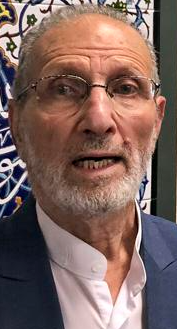September 03 2021

The US Treasury Department has told US Customs that it is legal for a mosque in Manassas, Virginia, to import Iranian-made tiles for use in the mosque—tiles US Customs earlier ruled could not be imported under US sanctions.
Alan W. Christian of the Office of Foreign Assets Control (OFAC), the agency that administers sanctions, signed a letter dated August 16 saying import of the tiles was “hereby authorized.”
He did not say why they were authorized, but the sanctions rules have an exemption for works of art, which is how Iranian films are imported for screening in American theaters.
Furthermore, the Imam of the mosque, Qom native Abolfazl Nahidian, said he had received a shipment of similar tiles eight months earlier with no objections. And he said he had received other tiles in prior years with no objection from customs.
The latest kerfuffle, therefore, appeared just to be another example of bureaucratic over-reaction a long-time problem with US sanctions.
The OFAC letter was dated seven days after Nahidian held a news conference to announce that US Customs had seized the tiles and told him they must either be returned to Qom or destroyed.
The tiles are to be used in the mihrab of a new mosque being built about six miles from the site of the current one, not far from the first major battle of the US Civil War in 1861.
Nahidian said the tiles were a gift and he paid no money for them, but a Customs and Border Protection officer at the airport blocked the mosque from claiming the tiles, citing the sanctions.
Nihad Awad, executive director of the Council on American-Islamic Relations (CAIR), told the news conference that whatever one’s views are of the Iranian sanctions, it makes no sense to enforce the rules on a benign piece of religious art. “They are not weapons of mass destruction,” Awad said. “We believe the government should have common sense.”
The Associated Press earlier reported that a spokesperson for Customs and Border Protection (CBP) had confirmed that the tiles were placed on hold June 21 and that on June 30, the Treasury Department’s Office of Foreign Assets Control determined that, under the sanctions imposed on Iran, the 750 pounds of ceramic tiles could not be imported.
However, Nahidian produced an email from OFAC that said Customs should have contacted OFAC first, before it acted to seize the tiles.
Some speakers at the news conference suggested that anti-Islam sentiment might be responsible for the confiscation. “If this were a statue of the Virgin Mary, would we be here discussing this?” asked Rafi Uddin Ahmed, president of the Muslim Association of Virginia.
Nahidian has led the mosque for nearly three decades, and has occasionally drawn scrutiny from critics who say he is anti-Israel and was a supporter of the ayatollahs in the Iranian Revolution. He has blamed the September 11 attack on Israel; in 1979, he and others chained themselves to the railings of the Statue of Liberty after climbing to the top and unfurling banners criticizing the Shah.
Nahidian said his history is irrelevant to whether the tiles can be imported.